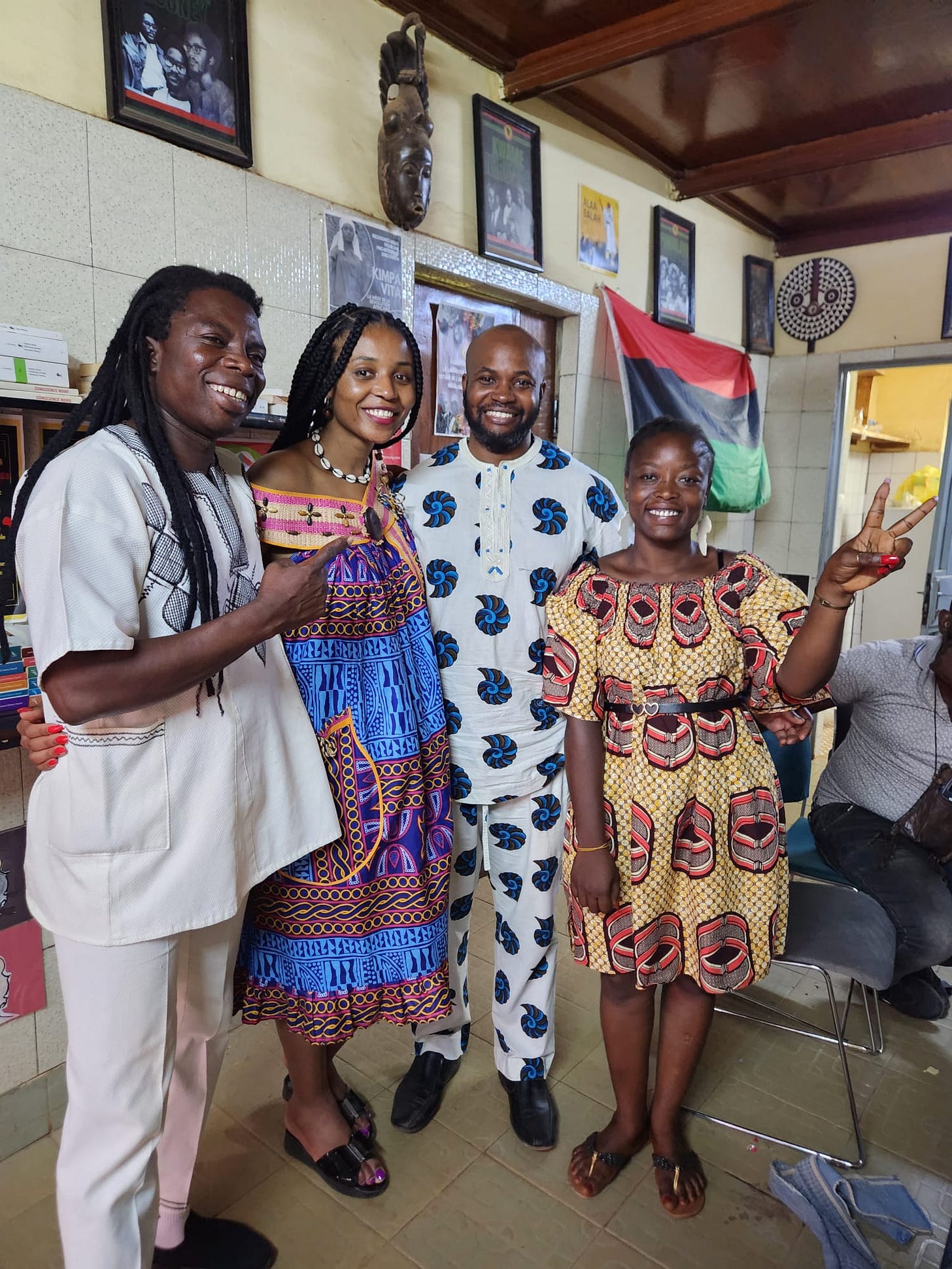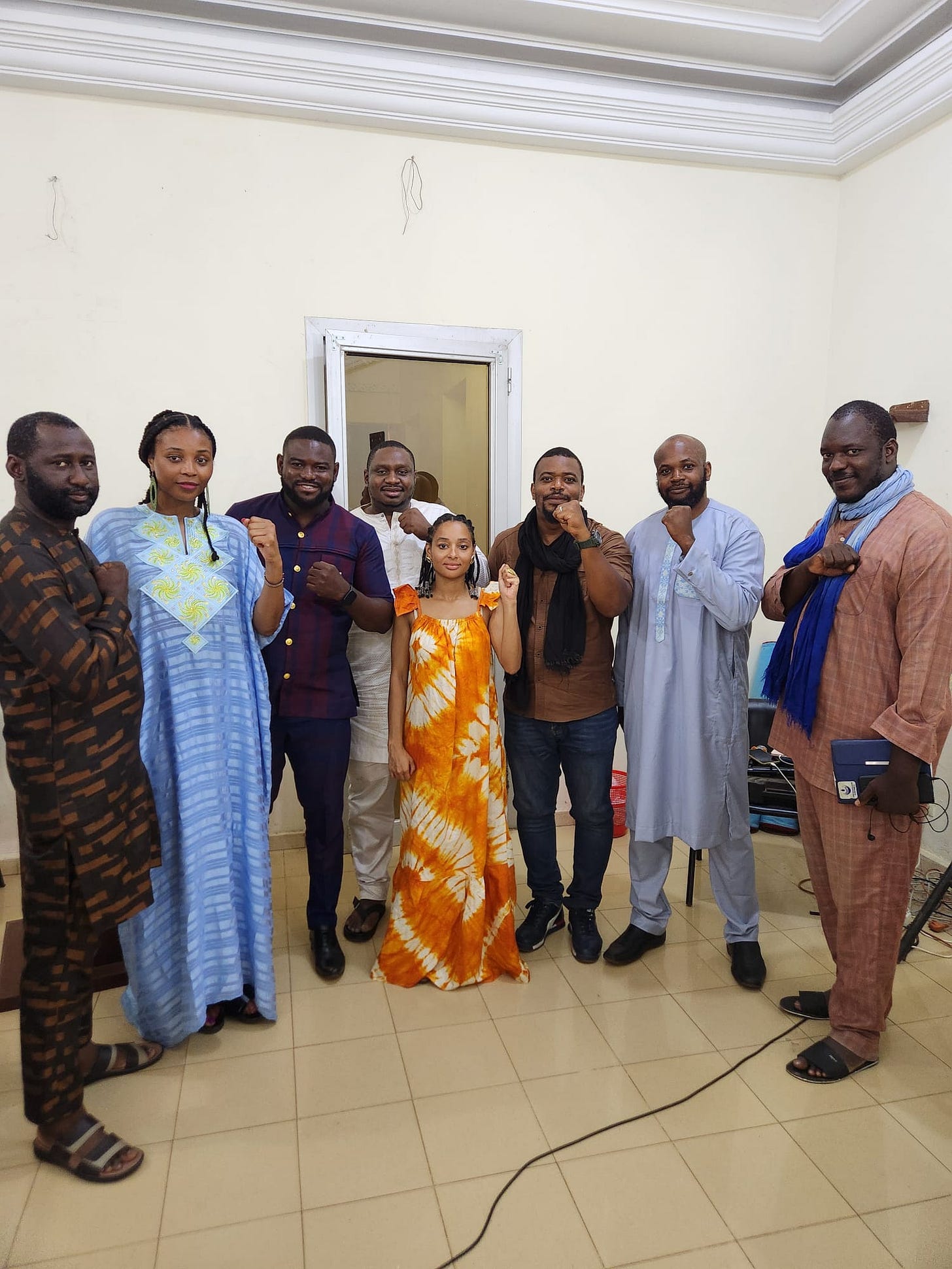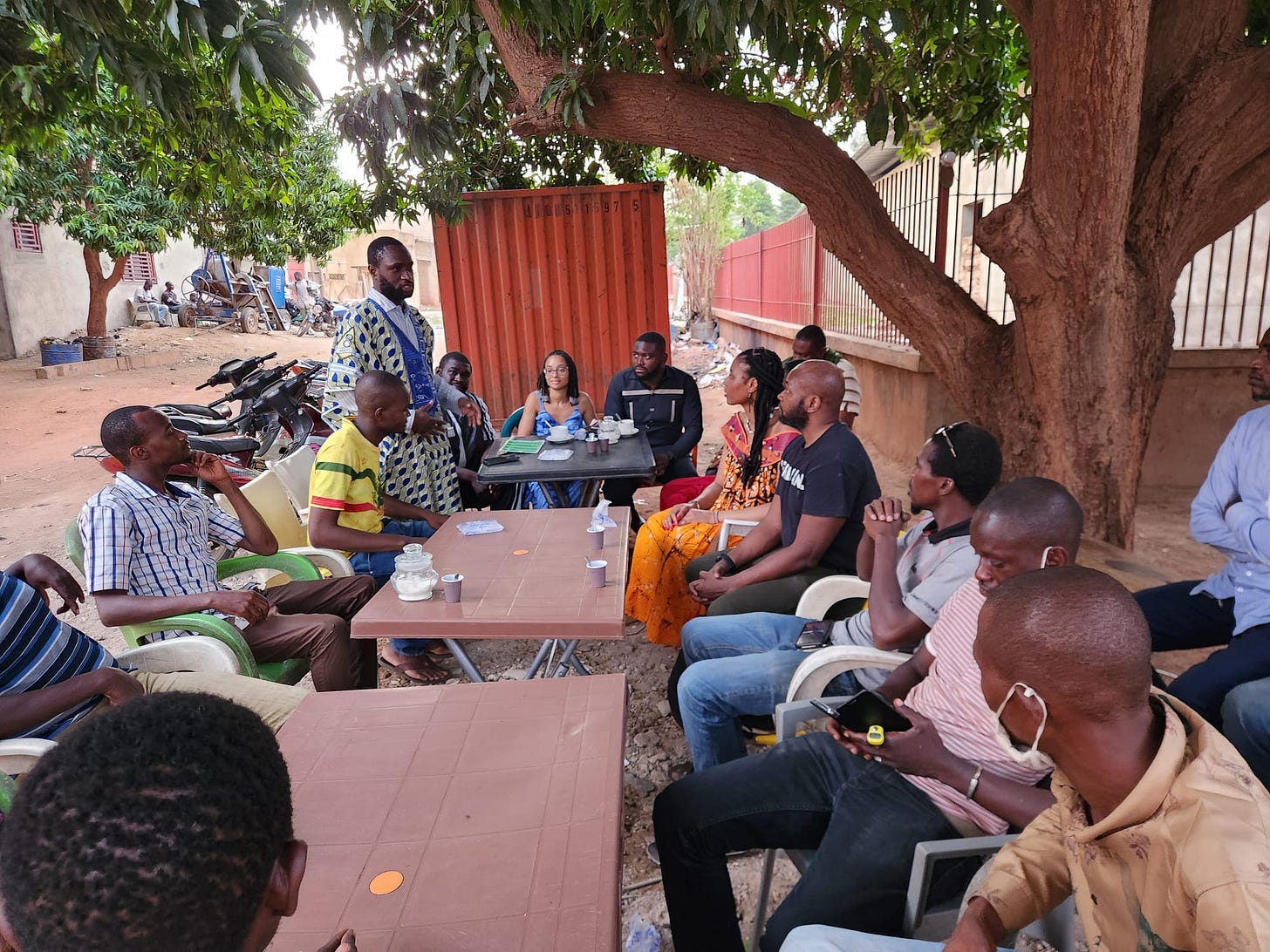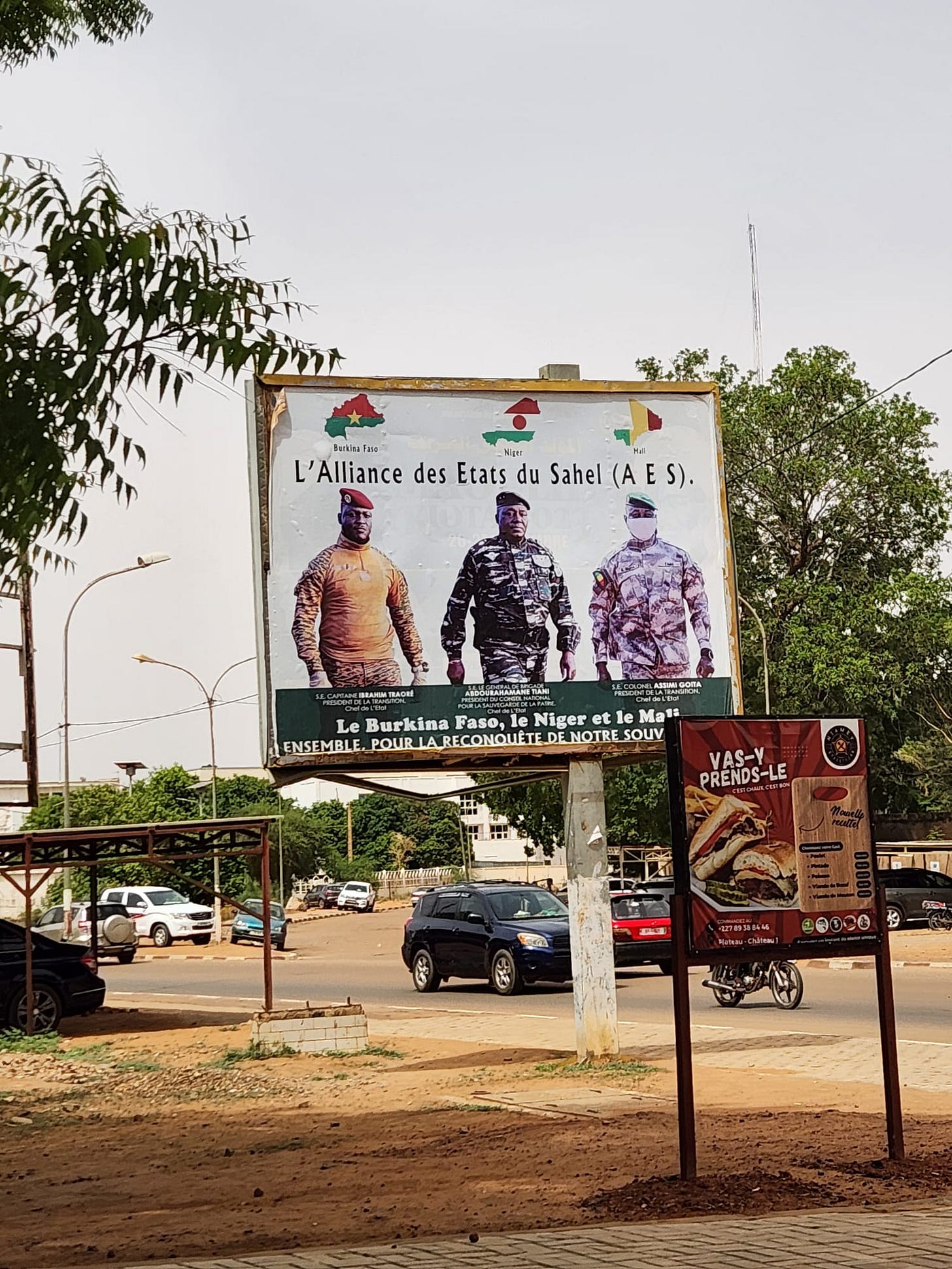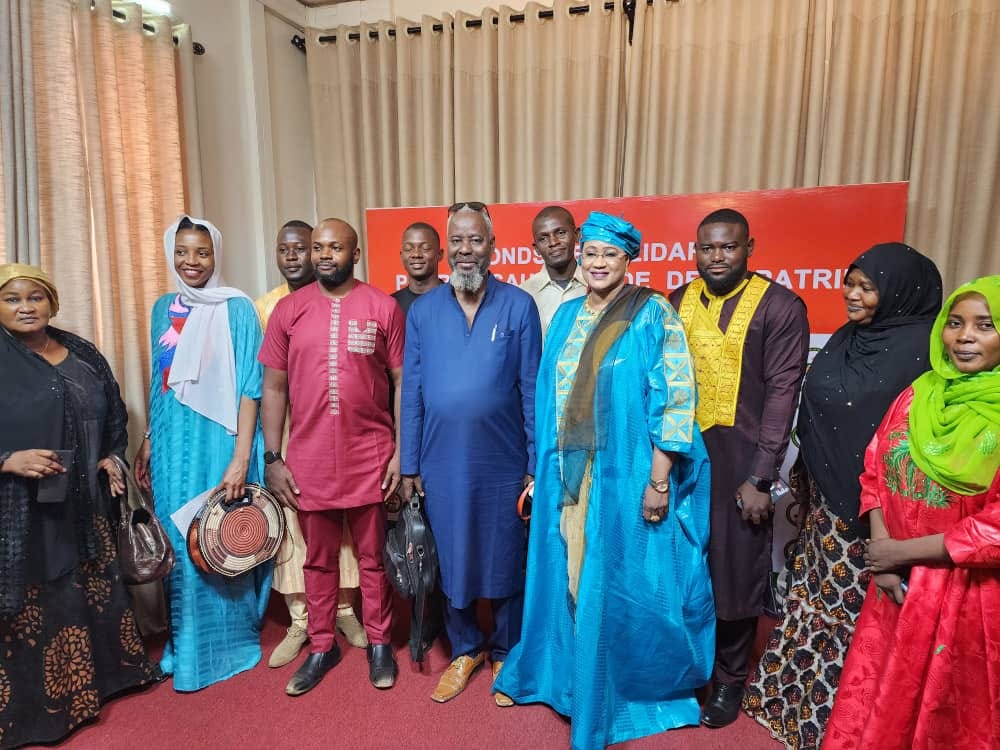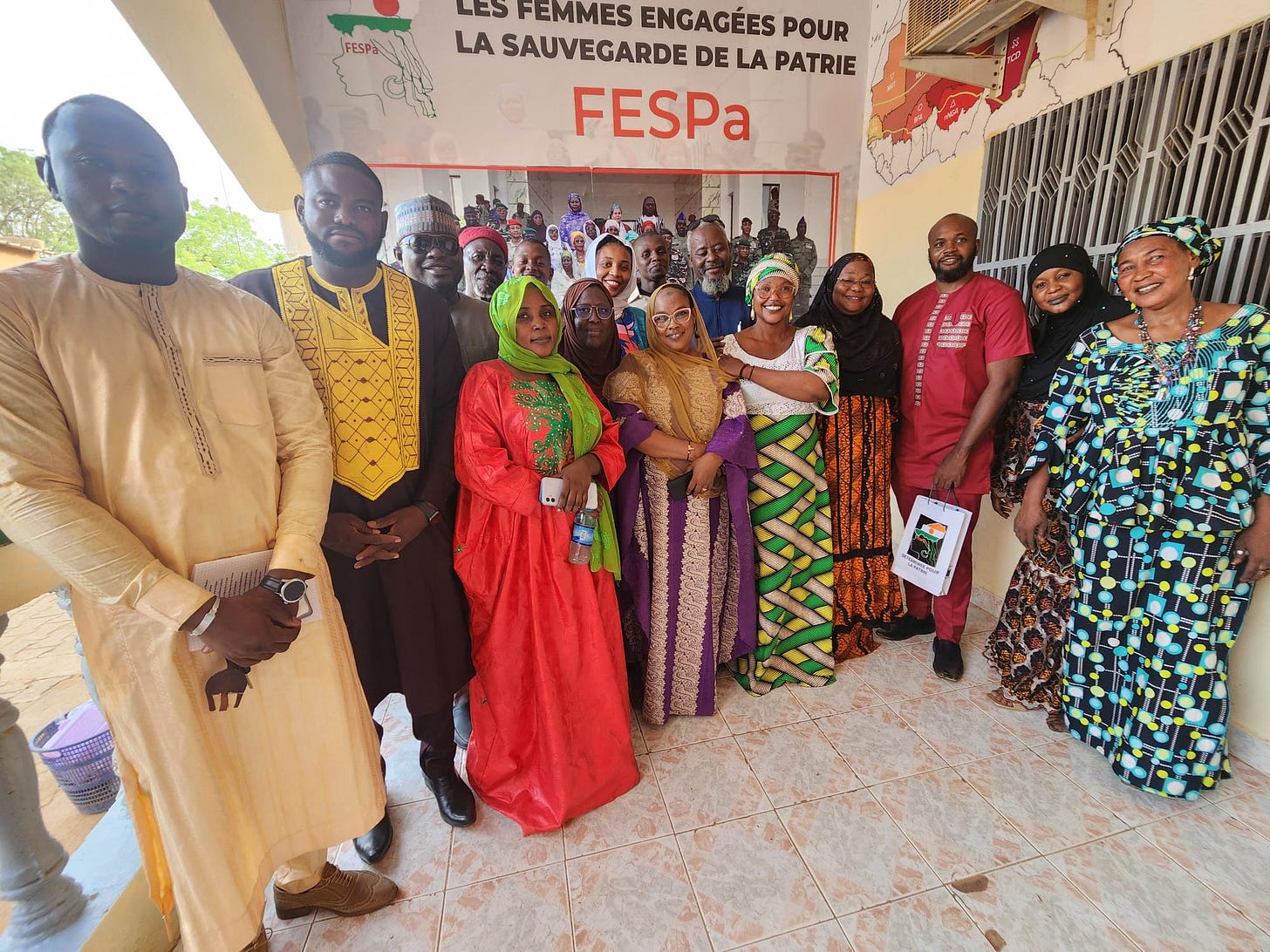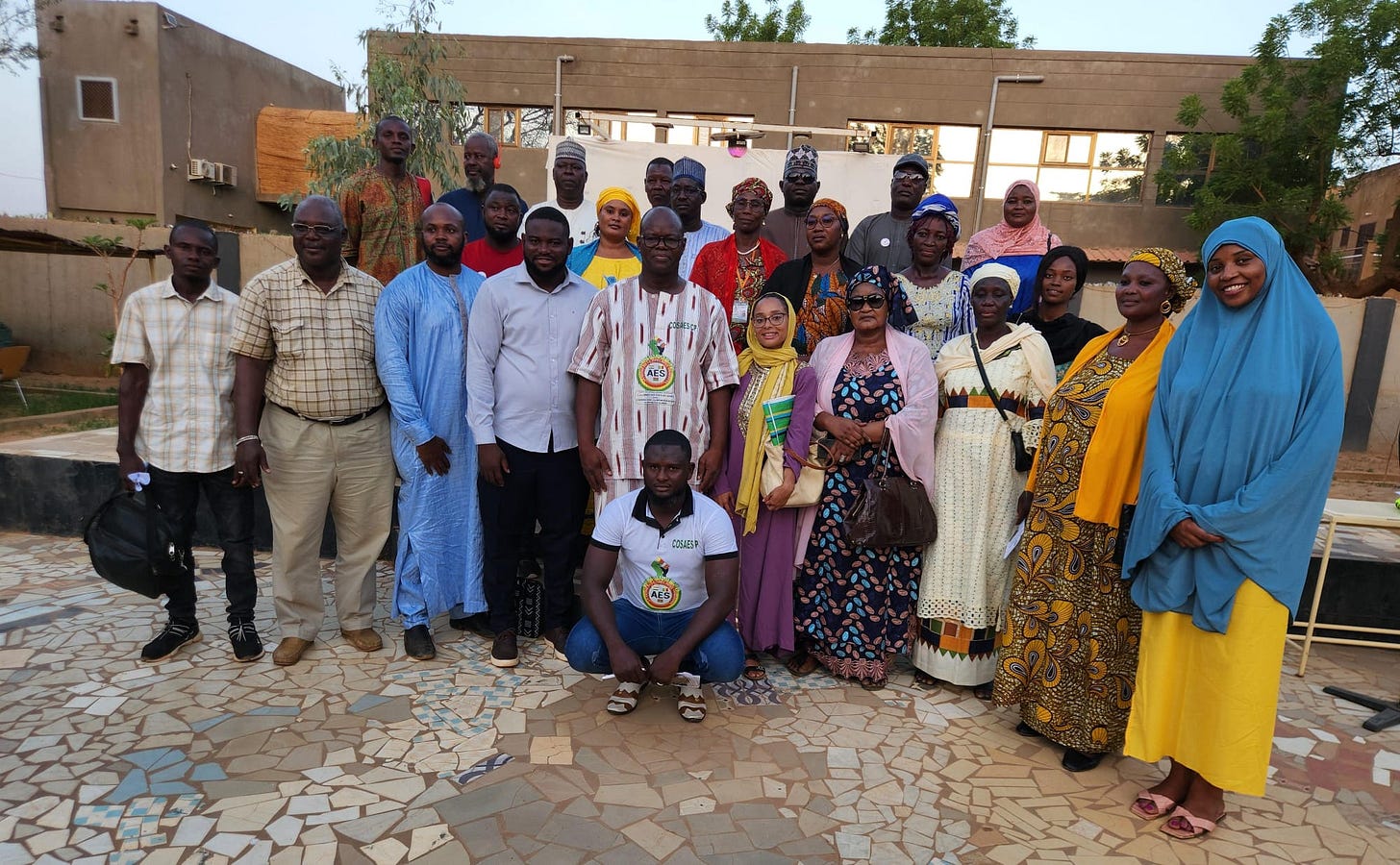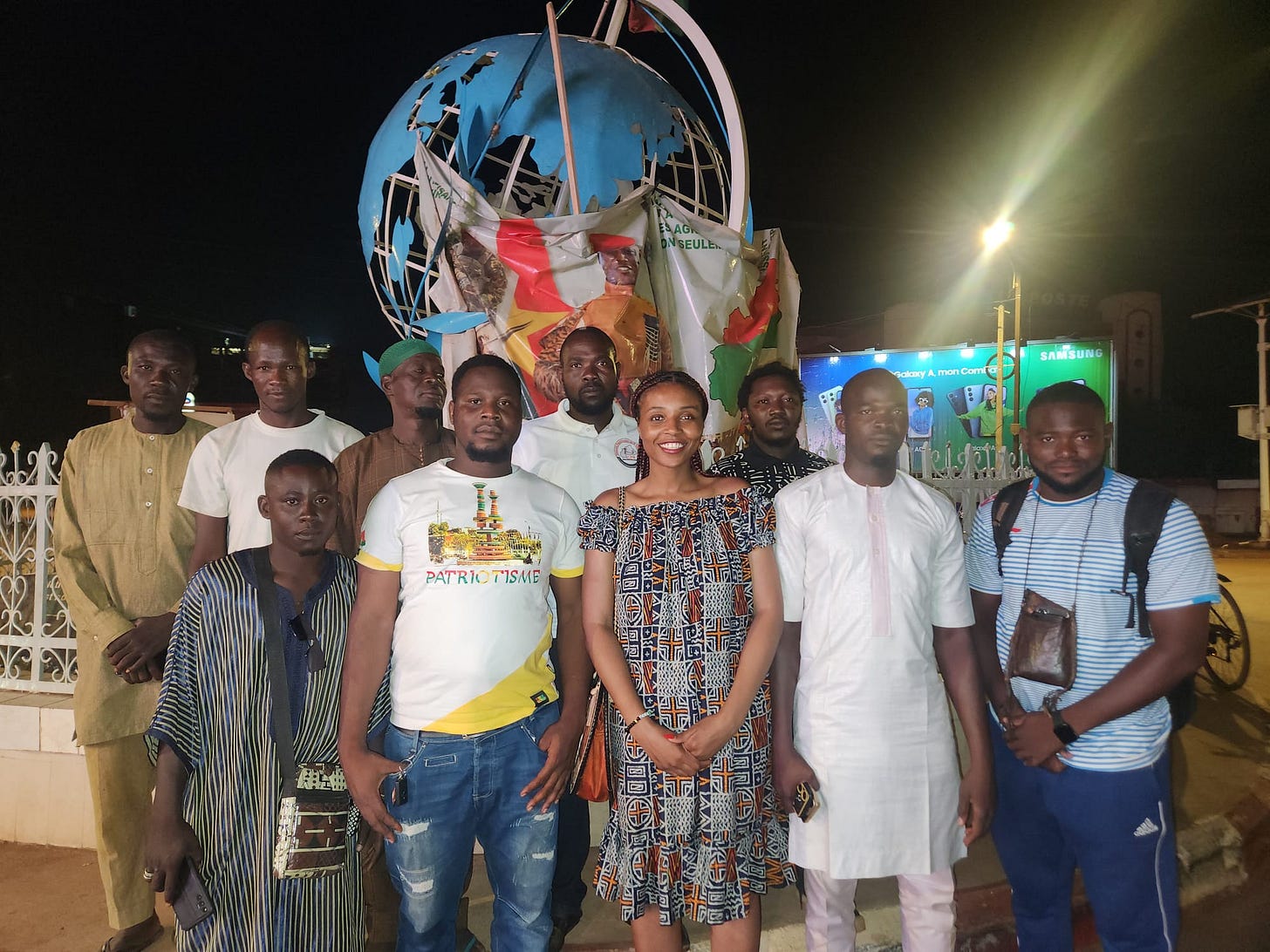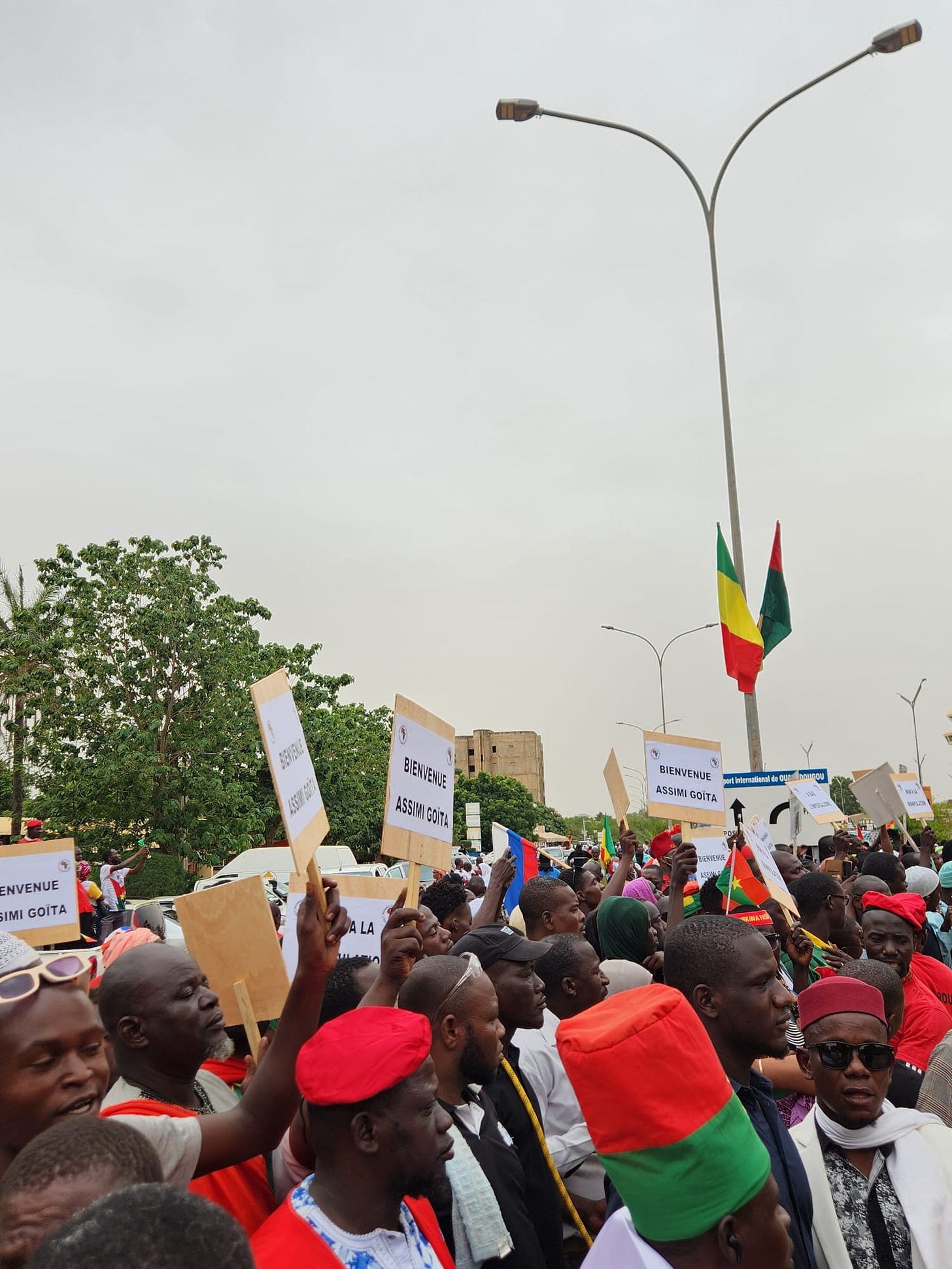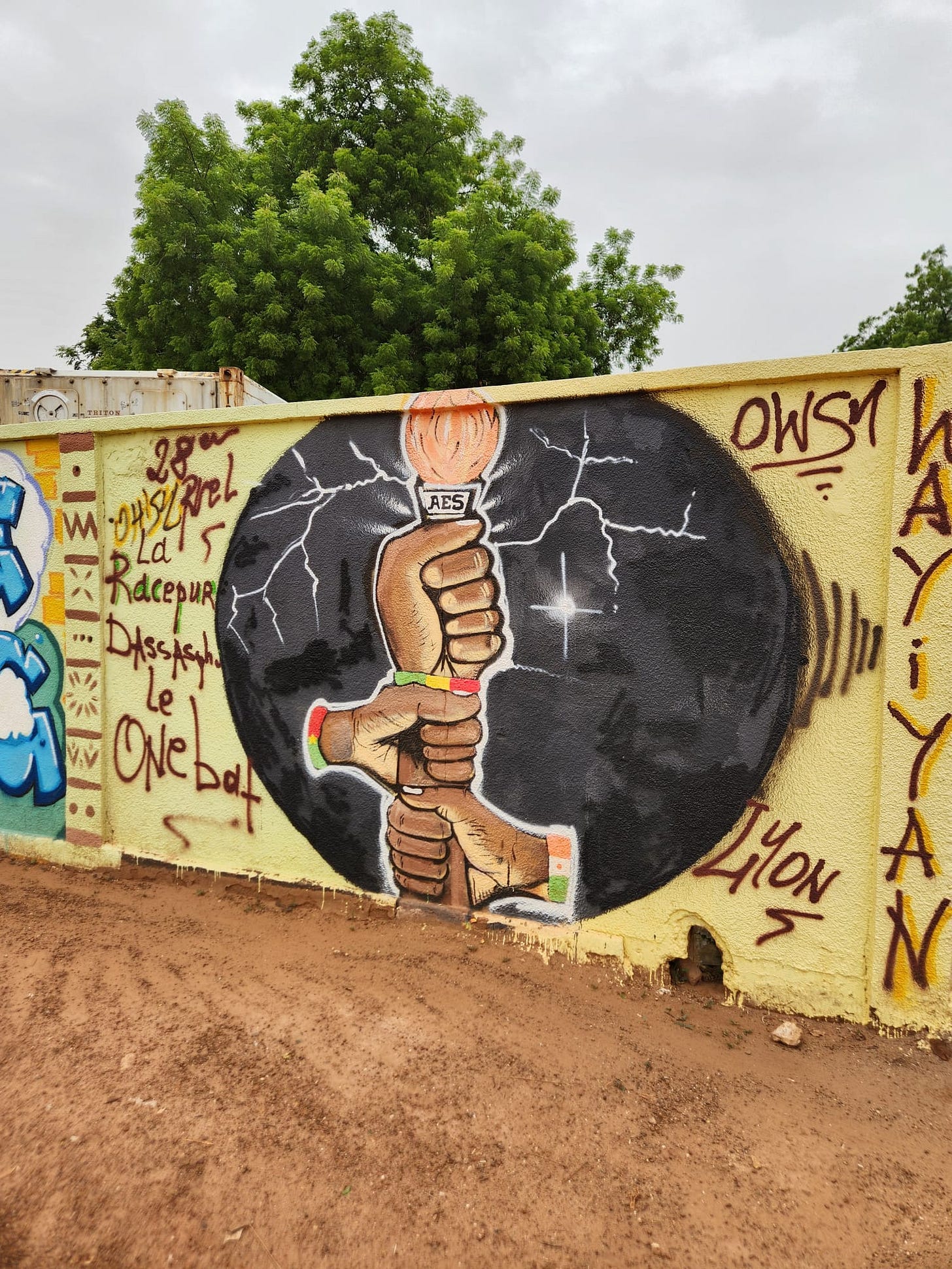Defending the AES, report back from Africa’s liberated zones
Prudence and Obioma are Pan-African organizers and members of the Coalition for the Elimination of Imperialism in Africa. They recently returned from a delegation trip to the Alliance of Sahel States
On June 9th, 2024, we landed at the Thomas Sankara International Airport in Ouagadougou, Burkina Faso and were welcomed by comrades Inemesit and Wendlassida from the Thomas Sankara Center for African Liberation and Unity. Ouagadougou marked the first stop in our delegation throughout the Alliance of Sahel States (AES).
Popular coups have swept the sahel and overthrown neo-colonial governments in Mali, Burkina Faso and Niger. The Alliance of Sahel States was formed on September 16th, 2023 and declared a confederation on July 6th, 2024, during the first summit of heads of states of the AES.
Since taking its destiny in its own hands, the people of the AES, led by upright men, have made several positive advancements across multiple fronts. French and American bases and soldiers have been sent home, colonial treaties have been revoked and a project of collective industrialization has been launched. Mali, Burkina Faso and Niger are a clear example that together we are indeed stronger, and only through a united front can we effectively address the problems of Africa. The AES offers us a clear path to achieve Pan-Africanism ( the liberation and unification of Africa under socialism) and today represents the tip of the spear in our fight against imperialism. This is why our coalition, the Coalition for the Elimination of Imperialism in Africa, felt the need to organize a delegation to what we firmly believe to be Africa’s liberated zones.
We had three primary objectives during this delegation. Firstly, we wanted to connect with anti-imperialist organizations in this region. Although we applaud and support the three revolutionary presidents at the head of these states, we know their arrival was only possible due to the revolutionary grassroots movements that preceded the overthrow of neo-colonialism in the AES. Secondly, we wished to bring material support to the AES. Our coalition had fundraised to be able to make contributions to each of the member states of the AES. Finally, our third objective was to connect the revolutionaries in the AES to each other which is why two members of the Thomas Sankara Center in Ouagadougou accompanied us throughout this delegation.
Ouagadougou, the capital of Burkina Faso, is an incredibly charming cityscape rife with art and traditionally inspired architecture. As you exit the airport, there is a long mural filled with revolutionary propaganda imagery. Pro-AES slogans, an image of Captain Ibrahim Traore alongside Vladimir Putin, drawings promoting resilience and unity and of course the beloved Thomas Sankara all adorn the wall. Ouagadougou is an incredibly artistic town, and revolutionary monuments are to be found throughout the city. For instance, roundabout October 2nd commemorates the speech that Thomas Sankara delivered on October 2nd, 1983, which established the theoretical foundation of the revolution. And not far from there, you come across the Monument des Cinéastes Africains (The African Filmmakers Monument) which honors the African filmmakers who participate in FESPACO (the Pan-African Film and Television Festival of Ouagadougou). FESPACO is a film festival in Burkina Faso, held biennially in Ouagadougou, where the organization is based. It accepts for competition only films by African filmmakers and chiefly produced in Africa.
We traveled straight to the Thomas Sankara Center which is located in the residential neighborhood of Cissin and were greeted by other members of the center as well as some of the children of their youth program. The Thomas Sankara Center is a Pan-African library and political education center. It houses a free lending library with revolutionary books that are otherwise unavailable in Ouagadougou. They also run a free afterschool young pioneers program for primary/ elementary school children. The children come to learn about Africa, the languages of Africa, the resources of Africa, and our Pan-African ancestors. In addition they also host film screenings, debates, and other events that further political consciousness ( follow them on IG @burkinabooks).
The following morning, we accompanied comrade Inemesit and Wendlassida to the Cuban Embassy where they were due to interview her excellency Madam Nadieska Navaro Barro to discuss the historical relationship between Burkina Faso and Cuba. This interview was featured in a paper for the Latin American Studies Association Conference held in Bogota. You can read the paper at Hood Communist.
Later that day, we took off for Bamako, Mali where we spent 4 days. Mali was the first AES country to break with French imperialism and resurrect the flame of revolution in Africa. For that reason, we came in with high expectations for this revolutionary country and its militant people.
Unlike Ouagadougou and Niamey, Bamako is a very metropolitan city with visible western influence. Perhaps because Mali returned to the revolutionary path much earlier than the birth of the AES, the pro-AES propaganda was much more subdued. The three flags seen at every major roundabout in Ouagadougou were instead on the back of a motorbike or the dashboard of a taxi.
Although all three countries of the AES suffer from low energy production, we felt it more in Bamako. There wasn't much life in the city center, very few operating businesses and very few lights. Our Malian comrades explained that the country was experiencing very frequent and very long power outages for reasons which dates back to the previous administration's mismanagement of state affairs. They explained that the previous government focused almost exclusively on expanding electrical energy production using diesel and heavy fuels. Fuel supplies were managed by both local private companies and the state-owned utility. However, this system allowed for rampant corruption, fraud, and theft. The new government, which is committed to uprooting corruption, has been arresting individuals and shutting down firms that were stealing the rightful wealth of the masses, while also setting up transparent systems for fuel management and expanding alternative means of electricity generation, like solar power. But until these alternatives are up and running, the country will have to endure these power outages. Because Bamako is far more developed and metropolitan than the other two capitals of the AES, it has a more pronounced petite bourgeoisie and therefore more class contradictions. That explained why we encountered most of the critiques against the current government and the AES in Mali. As even some of those who offered a critique of the developments in Mali would attest, the rupture with French neo-colonialism and the clamp down on corruption led to a loss of revenue for the elites and those who benefited from their patronage system.
Despite these contradictions, it was easy to see why Mali was the first to break with the West and choose the path of self-determination. Mali has a serious, militant and organized anti-imperialist movement. We had the opportunity to meet with half a dozen organizations and although some had drastically different ideologies and organizational methods, what all of them had in common was the understanding that in order for the country to move forward it had to break completely with western imperialism. They were totally uncompromising on the absolute necessity to kick out western armies and institutions. Something else they all had in common was the absolute necessity for the AES to operate as a single state. It was in Mali that we heard the strongest calls for an immediate federation of all three countries. During a meeting with the organization Quartier General de la Revolution (Headquarters of the Revolution), their president, Pape Diallo, stated that for them Mali, Burkina Faso and Niger did not exist. Only the AES. They lived and struggled for the AES. They invited us along with the comrades from the Thomas Sankara Center, to co-author a declaration calling for the federation of the AES. By the time we left two days later, the declaration was finished and they had organized a press conference. Sadly we were traveling that day and were unable to attend.
The level of seriousness amongst these revolutionaries was incredibly inspiring to us. Meeting times were respected, the facilitation of meetings was effective and inclusive (we attended a meeting that was facilitated in both French and Bambara, one of Mali's national and official languages) while discussion and debate was welcomed as a method of sharpening analysis and discarding incorrect ideas. Another impressive observation of the various anti-imperialist organizations in Mali was their ability to collaborate and sympathize despite having different ideologies. It was very common to find someone from one organization attending the meetings of another organization. In fact, all our meetings in Bamako were organized by one comrade, Mamadou Lamine Diarra, who only belongs to a single structure,GRAME-MAAYA, but has maintained great relationships with various structures. This level of principled behavior and revolutionary comradery is remarkable and something many of us in the diaspora can learn from.
Before we left Bamako, our comrade Mrs. Assitan Keita (featured in one of the webinars we have hosted on the AES) connected us with a representative of the Ministry of Health and Social Development, Mr Souleymane Traore. Our coalition made a donation of 300.000 CFA to that ministry. During our audience with members of that ministry, they shared the humanitarian needs of the country citing a particular need for medical supplies and equipment. They also mentioned that camps of displaced people were currently set up within the city due to the Western-backed destabilization of the resource-rich northern region of Mali. Though great gains have been made under the revolutionary government of Mali, this discussion also served as a reminder that one of the responsibilities of Pan-Africanists everywhere is to also provide material support to those on the frontlines of the struggle against imperialism in Africa.
Rather than leaving Bamako for Niger, we chose to return to Ouagadougou. Although these are three neighboring countries, travel between them isn't straightforward. There were no direct flights between Mali and Niger and it just ended up making more sense to return to Ouagadougou than to spend an entire day traveling through two different countries to reach a neighboring country. We look forward to the AES airline to address this issue!
We returned to Ouagadougou the weekend of Eid and were honored to receive many invitations to various celebrations. Burkina Faso is roughly 60% muslim, 30% christian and 10% practice indigenous religions. And all groups live in total harmony. The Christians expect to be included for Eid and the Muslims expect to be invited for Christmas. Religious intolerance is nonexistent which is why any western narrative naming religious extremism as a cause of violence in the region must never be taken seriously. That weekend, we also visited some of the famous monuments of Ouagadougou such as the Monument of National Heroes and the Great Mosque of Kanazoe. We also went to the big market, eager to purchase the t-shirts of the beloved Captain Ibrahim Traore we often saw on young Burkinabes. Only a liar could deny the overwhelming admiration and support the people have for Ibrahim Traore and his government. It is a new day in Burkina Faso. People understand a liberated Africa, the seeds of which were planted by our noble ancestors, can bloom with their hard work, sacrifice, unity, and revolutionary love.
On Monday, we took off for Niamey. Upon landing, we were pulled aside by the national police and our passports (one Canadian and one American) were seized. Thankfully, our comrade Hamadou Ibrahim had connected us to Mrs Ramatou Issa, national coordinator of the organization L’Autre Regard who picked us up from the airport. When we notified her that we were being held by the police, she came in and sorted the situation for us. We were finally released but our passports were not returned to us. We have to admit that this entire ordeal pleased us tremendously. Canada and the United States are enemy countries of Niger in particular and Africa in general and its citizens should be treated as potential threats, until proven otherwise.
As soon as you exit the Diori Hamani International Airport in Niamey you are greeted by 4 flags; one of each AES member state and the Russian flag. A few hundred meters away you will find the Place of Resistance. The area used to host a French military base, but was renamed after the French were chased out. Niamey, like Ouagadougou, is filled with pro-AES propaganda. Nearly all major roundabouts feature the 3 AES flags along with Russia’s. You will also find pictures of all three AES presidents with a message promoting unity amongst the people of the AES. In Niamey, we were hosted by the Union des Syndicats Libres des Travailleurs du Niger (USLTN), a local trade union. We were fortunate to be connected with their general secretary Hamadou Ibrahim just after our coalition was founded a year ago. We were overwhelmed by our comrades' hospitality and generosity. African hospitality is legendary, but the Nigeriens take it to new heights!
The members of the USTLN represent a variety of industries from midwives to teachers to electricians. They told us that the sanctions which had been imposed by ECOWAS(Economic Community of West African States) as well as the European Union had led to a loss of employment for many due to the closure of several industries. Despite the difficulties that they've had to endure, our comrades were very clear about their support for the CNSP, the new authorities in power and the path that the country was taking. They recognized that the road for self-determination would be paved with many hardships that had to be endured to ensure the triumph of the revolution. This sentiment is one we constantly heard in Niger and one that was echoed by President Abdourahmane Tchiani who stated that this struggle was not for those who were alive today, but for those who would come later on.
The following day we went to see the Police Commissioner to retrieve our passports. He let us know that seizing the passports of citizens from imperialist countries was common practice to ensure the security of the country. We shared with him our reason for coming to Niger and gave him a copy of the declaration we wrote in defense of the AES. He was incredibly pleased to hear about our delegation and expressed his deep commitment to the revolutionary struggle his country had undertaken. We exchanged contacts and he told us to alert him next time we were coming to Niger and he would ensure a smooth entrance for us.
Right next to the Directorate General of National Police you will find the Great Mosque of Niamey. The mosque is commonly referred to as Gaddafi’s mosque because it was partly funded by the government of the late great Muammar Gaddafi. Though a magnificent structure, it is a small symbol of the period when the Jamahiriya was at the vanguard of the struggle for Pan-Africanism. We failed to defend Libya from the NATO-backed assault that destroyed Libya and unleashed a new wave of terror across the Sahel. In a dialectical fashion, resistance to that terror was one of the factors that birthed the AES.
As our objectives also included bringing material support, we visited the Fonds de Solidarité pour la Sauvegarde de la Patrie (FSSP), a fund that was created following the brutal sanctions inflicted upon Niger after the overthrow of neocolonialism. Its primary objective is to mobilize national and international resources to meet the costs of preserving national sovereignty. Our coalition made a contribution of 300.000 CFA and was given an audience with the president of this fund, the remarkable Mrs Reki Moussa Hassane Djermakoye. During our meeting with Mrs. Reiki, she expressed how pleased she was to see Africans from the diaspora having traveled all the way to Niger not only to witness the revolutionary progress, but to support it. The solidarity fund has a website (https://fssp.ne/) and accepts donations virtually. We encourage all justice loving people to make regular contributions to support the revolution in Niger.
In our most remarkable encounter of Niger and possibly of the entire delegation, we met with the Femmes Engagés Pour la Sauvegarde de la Patrie (Women Committed to Safeguarding their Homeland), a women-led organization that was founded the day after the coup d’état of July 26th, 2023. Their coordinator Mariatou Amadou,shared with us that three days after the coup, they mobilized thousands of women at a French military base to demand their departure and show their support for the new authorities of Niger. In addition, they also organized what they call ‘casserole day’ where they mobilized women throughout the city to come on the streets with their pots and pans, making noise, which to them symbolized chasing out the western forces. When ECOWAS placed brutal sanctions upon Niger and various essential products such as liquid soaps, laundry detergent and bleach became scarce, they organized their members to create these items themselves. They would use some for consumption, and sell the rest. The Femmes Engagés Pour la Sauvegarde de la Patrie ( FESPA) counts a membership of nearly 1500 women and has members in surrounding villages. Kwame Nkrumah stated that the degree of a country’s revolutionary awareness may be measured by the political maturity of its women and when you apply that to Niger with its incredibly militant and organized women, you realize that Niger has a high degree of revolutionary awareness. The women of FESPA do not represent an isolated and unusual group in Niger, they represent the mass character of the revolution in Niger. A revolution whose foundation is its women.
Another impactful meeting was with the Comité de Soutien à l'Alliance des Etats du Sahel pour une Conscience Patriotique( AES Support Committee for Patriotic Consciousness). The Comité de Soutien à l'AES pour une Conscience Patriotique (COSAES/CP) is a Pan-Africanist and anti-imperialist organization that struggles alongside the CNSP (government of Niger) for the liberation of the AES and Africa. Their organization is made up of Africans from all three member states of the AES. Once again, we were incredibly impressed with the central role of women in this organization. Their thriving women’s wing is made up of young and older african women from all three member states of the AES.
Similarly to our experience in Mali, the organizations and political parties of Niger are totally aligned on two points: the need to make a total break with western imperialism and the need to formally unite with Burkina Faso and Mali in order to wage a successful struggle. To be amongst a people that so clearly understands the stakes and are so totally dedicated to defending the dignity of Africa was truly nourishment for the soul. The mass character of their struggle and the great involvement of women in that struggle makes it impossible for someone (in good faith) to contest the fact that Niger is a revolutionary country.
After 5 days with the revolutionary people of Niger, we returned to Burkina Faso where we had just two more days before our delegation came to an end. Upon our return we were incredibly happy to hear that our beloved Colonel Assimi Goita, President of Mali, would be making his first visit to Burkina Faso (and his first visit to an African country). That night, we joined the Veille Citoyenne at the Ibrahim Traore roundabout where they had organized a press conference to announce the upcoming visit of our Malian president, and encouraged the masses to mobilize at the airport to welcome him. La Veille Citoyenne (Citizen’s Night Watch) is a people’s organization that mobilizes every night in all major roundabouts in the country in order to watch over the nation and protect the revolution. We were deeply humbled by such a display of patriotism and commitment to the struggle and were amazed to see that young and old, man and woman participated in this daily night watch.
That morning, which marked our final day in the Sahel, began at the Thomas Sankara Memorial where we met with the General Secretary of the International Committee of the Thomas Sankara Memorial Mr. Luc Damiba and we discussed the great expansion plan of the memorial which will be handled by a Burkinabe architecture firm, Kéré Architecture. Afterward, we went to the Central Directorate for Social Action and Operational Casualties, which is a department within the armed forces that takes care of the families of fallen soldiers. Our coalition made a donation of 300 000 CFA there.
We then made our way to the airport to welcome our Malian President. The streets were filled with people waving the flags of the three AES countries and holding banners with welcoming messages for the beloved Malian President. It is undeniable that the leadership of the AES is loved and supported by the masses across the AES. They are the people’s presidents which is why their portraits are seen across the three countries and worn on the shirts of youth across the three countries. The people of the AES are one. They recognize that the borders that divide them were enforced by their enemies and therefore are illegitimate.
During our delegation we constantly heard from comrades and the local masses that the struggle in the AES is one for all of Africa and the AES would free all of Africa. This was just the beginning, all of Africa would join this dynamic and we would build the United States of Africa. Our time in the AES is something we will never forget. To be amongst the revolutionary masses of the AES and to see them fully engaged in the struggle for liberation was both inspiring and humbling. The Alliance of Sahel States is the tip of the spear in our fight against Western imperialism. These are liberated zones and as Nkrumah taught us, they must be our priority. It is much harder to defend a liberated zone than it is to liberate a zone. To be a Pan-Africanist today means to serve, protect and defend the AES. If we fail to do so, and if we lose this momentum, history will not absolve us. We call on all African people, across this world, to recognize that their fate is tied to the fate of the AES and to make it a priority to defend this region by any means necessary.
We are re-invigorated and ready to intensify our work to defend the AES. Like our comrades at the Thomas Sankara Center say, today the AES, tomorrow the United States of Africa! Long live the revolutionary masses of the AES!


